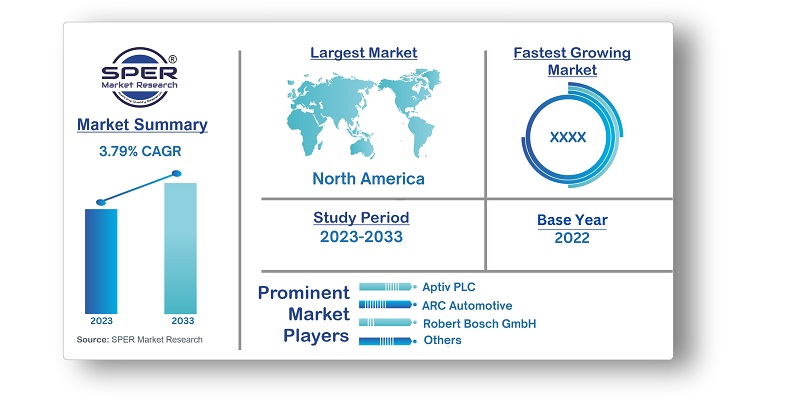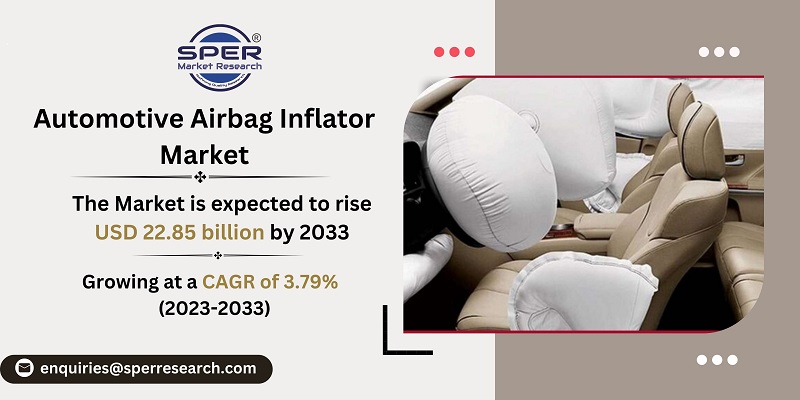
Automotive Airbag Inflator Market Growth, Trends, Size, Revenue, Challenges and Future Outlook
Automotive Airbag Inflator Market Size- By Product Type, By Component Type, By Vehicle Type- Regional Outlook, Competitive Strategies and Segment Forecast to 2033
| Published: Jul-2023 | Report ID: AMIN23120 | Pages: 1 - 218 | Formats*: |
| Category : Automotive & Transportation | |||
- Increasing Vehicle Production and Sales: Automotive airbag systems are now standard in luxury and mid-class cars, and their demand is expected to surge due to increased vehicle models and urbanization, leading to growth opportunities.
- Increasing Focus on Vehicle Safety: Automakers are working constantly to enhance the safety features in their vehicles due to the increased focus on vehicle safety. The importance of airbags and airbag inflators in ensuring occupant safety has increased demand for automotive airbag inflators.

- Increasing Vehicle Models: The automotive airbag inflator industry has good prospects thanks to the growing variety of vehicle models and the introduction of new vehicle types. There is expected to be an increase in demand for airbag inflators as more vehicles adopt airbag systems.
- Growing Urbanization: Urbanization is the growth and expansion of urban areas, especially in developing countries. As people migrate from rural to urban areas, demand for personal vehicles increases. Urban areas offer job opportunities, better infrastructure, and amenities, leading to increased mobility needs and transportation options for work, school, and other destinations.
- Stringent Safety Standards: Safety standards and laws are very strict for the automotive industry. Manufacturers of airbag inflators may find it difficult to adhere to these standards because they must maintain the performance and dependability of their products while adhering to ever-changing safety regulations.
- Technological Advancements: As technology advances, automotive airbag inflator manufacturers need to stay updated and invest in research and development to keep pace with the latest innovations. Failure to do so may result in being outperformed by competitors or facing difficulties in meeting consumer expectations.

| Report Metric | Details |
| Market size available for years | 2019-2033 |
| Base year considered | 2022 |
| Forecast period | 2023-2033 |
| Segments covered | By Product Type, By Component Type, By Vehicle Type |
| Regions covered | Asia Pacific, Europe, Middle East and Africa, North America, Latin America |
| Companies Covered | Aptiv PLC, ARC Automotive, Inc., Autoliv Inc, Daicel Corporation, Joyson Safety System, Nippon Kayaku, Robert Bosch GmbH, Toyoda Gosei Co. Ltd, TRW Automotive |
- Automotive Manufacturers
- Automotive Component Suppliers
- Automotive Safety System Providers
- Regulatory Authorities
- Automotive Industry Associations
- Consumer Safety Organizations
- Others
| By Product Type: |
|
| By Component Type: |
|
| By Vehicle Type: |
|
- Global Automotive Airbag Inflator Market Size (FY’2023-FY’2033)
- Overview of Global Automotive Airbag Inflator Market
- Segmentation of Global Automotive Airbag Inflator Market By Product Type (Hybrid Inflator, Pyrotechnic Inflator, Stored gas inflator)
- Segmentation of Global Automotive Airbag Inflator Market By Component Type (Airbag Inflator Filter, Airbag Tubes)
- Segmentation of Global Automotive Airbag Inflator Market By Vehicle Type (Light Commercial Vehicle, Passenger Vehicle)
- Statistical Snap of Global Automotive Airbag Inflator Market
- Expansion Analysis of Global Automotive Airbag Inflator Market
- Problems and Obstacles in Global Automotive Airbag Inflator Market
- Competitive Landscape in the Global Automotive Airbag Inflator Market
- Impact of COVID-19 and Demonetization on Global Automotive Airbag Inflator Market
- Details on Current Investment in Global Automotive Airbag Inflator Market
- Competitive Analysis of Global Automotive Airbag Inflator Market
- Prominent Players in the Global Automotive Airbag Inflator Market
- SWOT Analysis of Global Automotive Airbag Inflator Market
- Global Automotive Airbag Inflator Market Future Outlook and Projections (FY’2023-FY’2033)
- Recommendations from Analyst
1.1. Scope of the report1.2. Market segment analysis
2.1. Research data source2.1.1. Secondary Data2.1.2. Primary Data2.1.3. SPER’s internal database2.1.4. Premium insight from KOL’s2.2. Market size estimation2.2.1. Top-down and Bottom-up approach2.3. Data triangulation
4.1. Driver, Restraint, Opportunity and Challenges analysis4.1.1. Drivers4.1.2. Restraints4.1.3. Opportunities4.1.4. Challenges4.2. COVID-19 Impacts of the Global Automotive Airbag Inflator Market
5.1. SWOT Analysis5.1.1. Strengths5.1.2. Weaknesses5.1.3. Opportunities5.1.4. Threats
5.2. PESTEL Analysis
5.2.1. Political Landscape5.2.2. Economic Landscape5.2.3. Social Landscape5.2.4. Technological Landscape5.2.5. Environmental Landscape5.2.6. Legal Landscape5.3. PORTER’s Five Forces5.3.1. Bargaining power of suppliers5.3.2. Bargaining power of buyers5.3.3. Threat of Substitute5.3.4. Threat of new entrant5.3.5. Competitive rivalry5.4. Heat Map Analysis
6.1. Global Automotive Airbag Inflator Market Manufacturing Base Distribution, Sales Area, Product Type6.2. Mergers & Acquisitions, Partnerships, Product Launch, and Collaboration in Global Automotive Airbag Inflator Market
7.1. Global Automotive Airbag Inflator Market Value Share and Forecast, By Product Type, 2023-20337.2. Hybrid Inflator7.3. Pyrotechnic Inflator7.4. Stored gas inflator7.5. Others
8.1. Global Automotive Airbag Inflator Market Value Share and Forecast, By Component Type, 2023-20338.2. Airbag Inflator Filter8.3. Airbag Tubes8.4. Others
9.1. Global Automotive Airbag Inflator Market Value Share and Forecast, By Vehicle Type, 2023-20339.2. Light Commercial Vehicle9.3. Passenger Vehicle9.4. Others
10.1. Global Automotive Airbag Inflator Market Size and Market Share
11.1. Global Automotive Airbag Inflator Market Size and Market Share By Product Type (2019-2026)11.2. Global Automotive Airbag Inflator Market Size and Market Share By Product Type (2027-2033)
12.1. Global Automotive Airbag Inflator Market Size and Market Share By Component Type (2019-2026)12.2. Global Automotive Airbag Inflator Market Size and Market Share By Component Type (2027-2033)
13.1. Global Automotive Airbag Inflator Market Size and Market Share By Vehicle Type (2019-2026)13.2. Global Automotive Airbag Inflator Market Size and Market Share By Vehicle Type (2027-2033)
14.1. Global Automotive Airbag Inflator Market Size and Market Share By Region (2019-2026)14.2. Global Automotive Airbag Inflator Market Size and Market Share By Region (2027-2033)14.3. Asia-Pacific14.3.1. Australia14.3.2. China14.3.3. India14.3.4. Japan14.3.5. South Korea14.3.6. Rest of Asia-Pacific14.4. Europe14.4.1. France14.4.2. Germany14.4.3. Italy14.4.4. Spain14.4.5. United Kingdom14.4.6. Rest of Europe14.5. Middle East and Africa14.5.1. Kingdom of Saudi Arabia14.5.2. United Arab Emirates14.5.3. Rest of Middle East & Africa14.6. North America14.6.1. Canada14.6.2. Mexico14.6.3. United States14.7. Latin America14.7.1. Argentina14.7.2. Brazil14.7.3. Rest of Latin America
15.1. Aptiv PLC15.1.1. Company details15.1.2. Financial outlook15.1.3. Product summary15.1.4. Recent developments15.2. ARC Automotive, Inc.15.2.1. Company details15.2.2. Financial outlook15.2.3. Product summary15.2.4. Recent developments15.3. Autoliv Inc15.3.1. Company details15.3.2. Financial outlook15.3.3. Product summary15.3.4. Recent developments15.4. Daicel Corporation15.4.1. Company details15.4.2. Financial outlook15.4.3. Product summary15.4.4. Recent developments15.5. Joyson Safety System15.5.1. Company details15.5.2. Financial outlook15.5.3. Product summary15.5.4. Recent developments15.6. Nippon Kayaku15.6.1. Company details15.6.2. Financial outlook15.6.3. Product summary15.6.4. Recent developments15.7. Robert Bosch GmbH15.7.1. Company details15.7.2. Financial outlook15.7.3. Product summary15.7.4. Recent developments15.8. Toyoda Gosei Co. Ltd15.8.1. Company details15.8.2. Financial outlook15.8.3. Product summary15.8.4. Recent developments15.9. TRW Automotive15.9.1. Company details15.9.2. Financial outlook15.9.3. Product summary15.9.4. Recent developments15.10. Other
SPER Market Research’s methodology uses great emphasis on primary research to ensure that the market intelligence insights are up to date, reliable and accurate. Primary interviews are done with players involved in each phase of a supply chain to analyze the market forecasting. The secondary research method is used to help you fully understand how the future markets and the spending patterns look likes.
The report is based on in-depth qualitative and quantitative analysis of the Product Market. The quantitative analysis involves the application of various projection and sampling techniques. The qualitative analysis involves primary interviews, surveys, and vendor briefings. The data gathered as a result of these processes are validated through experts opinion. Our research methodology entails an ideal mixture of primary and secondary initiatives.



Frequently Asked Questions About This Report
PLACE AN ORDER
Year End Discount
Sample Report
Pre-Purchase Inquiry
NEED CUSTOMIZATION?
Request CustomizationCALL OR EMAIL US
100% Secure Payment






Related Reports
Our Global Clients
Our data-driven insights have influenced the strategy of 200+ reputed companies across the globe.




















